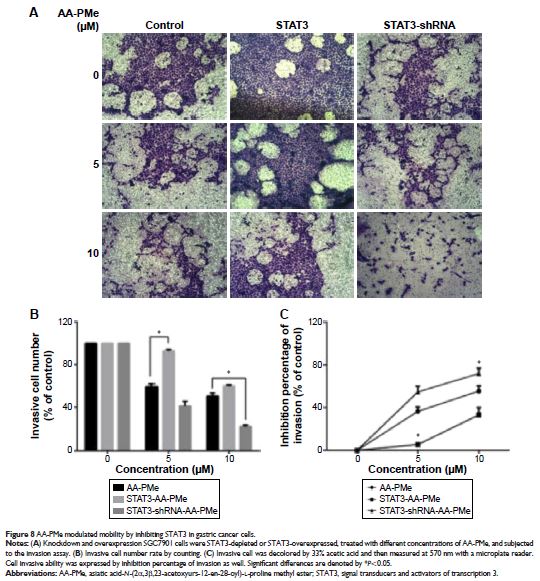109568
论文已发表
注册即可获取德孚的最新动态
IF 收录期刊
- 3.4 Breast Cancer (Dove Med Press)
- 3.2 Clin Epidemiol
- 2.6 Cancer Manag Res
- 2.9 Infect Drug Resist
- 3.7 Clin Interv Aging
- 5.1 Drug Des Dev Ther
- 3.1 Int J Chronic Obstr
- 6.6 Int J Nanomed
- 2.6 Int J Women's Health
- 2.9 Neuropsych Dis Treat
- 2.8 OncoTargets Ther
- 2.0 Patient Prefer Adher
- 2.2 Ther Clin Risk Manag
- 2.5 J Pain Res
- 3.0 Diabet Metab Synd Ob
- 3.2 Psychol Res Behav Ma
- 3.4 Nat Sci Sleep
- 1.8 Pharmgenomics Pers Med
- 2.0 Risk Manag Healthc Policy
- 4.1 J Inflamm Res
- 2.0 Int J Gen Med
- 3.4 J Hepatocell Carcinoma
- 3.0 J Asthma Allergy
- 2.2 Clin Cosmet Investig Dermatol
- 2.4 J Multidiscip Healthc

一种新的合成积雪草酸 (Asiatic acid) 衍生物通过抑制 STAT3 信号通路诱导凋亡并遏制胃癌细胞的增殖和迁移
Authors Wang G, Jing Y, Cao LS, Gong CC, Gong ZN, Cao XR
Received 5 September 2016
Accepted for publication 8 November 2016
Published 20 December 2016 Volume 2017:10 Pages 55—66
DOI https://doi.org/10.2147/OTT.S121619
Checked for plagiarism Yes
Review by Single-blind
Peer reviewers approved by Dr Akshita Wason
Peer reviewer comments 2
Editor who approved publication: Dr Ingrid Espinoza
Abstract: Activation of the transcription factor, signal transducers and
activators of transcription 3 (STAT3), has been linked to the proliferation and
migration of a variety of human cancer cells. These actions occur via the
upregulation or downregulation of cell survival and tumor suppressor genes,
respectively. Importantly, agents that can suppress STAT3 activation have the
potential for use in the prevention and treatment of various cancers. In this
study, an Asiatic acid (AA) derivative, N -(2α,3β,23-acetoxyurs-12-en-28-oyl)-L-proline
methyl ester (AA-PMe), is reported to dose dependently suppress constitutive
STAT3 activation in gastric cancer cells. This inhibition was mediated by
blockade of Janus-activated kinase 2. Additionally, AA-PMe regulated the
expression of STAT3-modulated gene products, including cyclin D1, Bax, Bcl-2,
c-Myc, and matrix metalloproteinase (MMP)-2 and MMP-9. Finally, transfection
with both a STAT3 mimic and an inhibitor reversed the AA-PMe-driven modulation
of STAT3 downstream gene products. Overall, these results suggest that AA-PMe
is a novel blocker of STAT3 activation and has the potential for the prevention
and treatment of gastric cancer.
Keywords: gastric cancer, signal transducer and
activator of transcription 3, Asiatic acid derivative, cell cycle, apoptosis,
invasion
